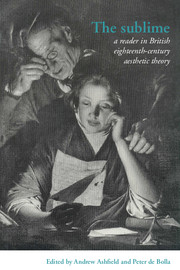Book contents
- Frontmatter
- Contents
- List of Abbreviations
- Introduction
- Part I The Longinian tradition
- Part II Rhapsody to rhetoric
- Part III Irish Perspectives
- Part IV The Aberdonian Enlightenment
- 28 An enquiry into the life and writings of Homer (1735)
- 29 Theodorus: a dialogue concerning the art of preaching (1752)
- 30 An essay on taste (1759)
- 31 An essay on original genius (1767)
- 32 Essays on the intellectual powers of man (1785)
- 33 Dissertations moral and critical (1783)
- Part V Edinburgh and Glasgow
- Part VI From the Picturesque to the Political
- Sources and further reading
31 - An essay on original genius (1767)
Published online by Cambridge University Press: 05 June 2012
- Frontmatter
- Contents
- List of Abbreviations
- Introduction
- Part I The Longinian tradition
- Part II Rhapsody to rhetoric
- Part III Irish Perspectives
- Part IV The Aberdonian Enlightenment
- 28 An enquiry into the life and writings of Homer (1735)
- 29 Theodorus: a dialogue concerning the art of preaching (1752)
- 30 An essay on taste (1759)
- 31 An essay on original genius (1767)
- 32 Essays on the intellectual powers of man (1785)
- 33 Dissertations moral and critical (1783)
- Part V Edinburgh and Glasgow
- Part VI From the Picturesque to the Political
- Sources and further reading
Summary
Book II. Section III. Of original genius in poetry
… What we would be understood to maintain is this; that original genius will dictate the most proper sentiments on every subject, and in every species of Poetry, indiscriminately; but that it will dictate the sentiments most proper to that particular species to which it is adapted, and to which it applies its inventive powers. If, for instance, we suppose this quality adapted to Epic Poetry, it will discover itself in the invention both of sublime and pathetic sentiments, which will at once excite astonishment, and penetrate the heart. To a person who possesses a talent for this highest species of Poetry, such sentiments are as it were congenial; they arise naturally and spontaneously to his imagination. The sublime, in particular, is the proper walk of a great Genius, in which it delights to range, and in which alone it can display its powers to advantage, or put forth its strength. As such a Genius always attempts to grasp the most stupendous objects, it is much more delighted with surveying the rude magnificence of nature, than the elegant decorations of art; since the latter produce only an agreeable sensation of pleasure; but the former throws the soul into a divine transport of admiration and amazement, which occupies and fills the mind, and at the same time inspires that solemn dread, that religious awe, which naturally results from the contemplation of the vast and wonderful.
- Type
- Chapter
- Information
- The SublimeA Reader in British Eighteenth-Century Aesthetic Theory, pp. 173 - 177Publisher: Cambridge University PressPrint publication year: 1996
- 1
- Cited by



